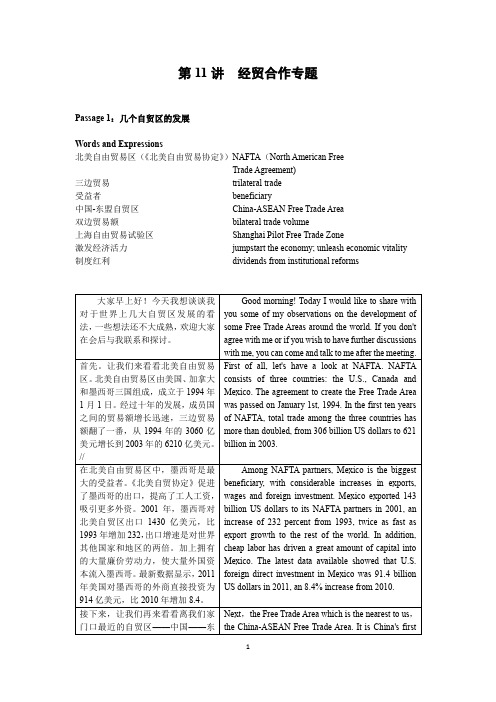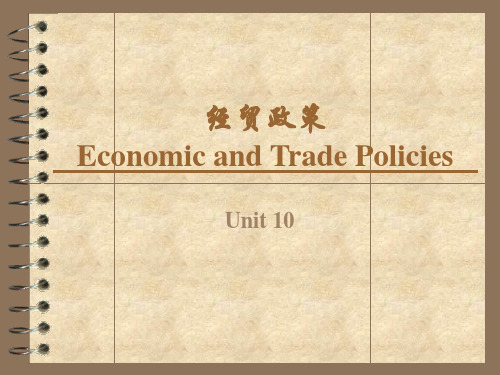商务英语口译Unit 11 Economic and Trade Policy
高级商务英语听说(第二版)Unit 11 Making Investment Rationally

The authorities in China announced yesterday that ___th_e__s_h_a_re__m_e_r_g_e_r _re_f_o_r_m_ would be extended to the whole market, sparking a smart rally on the Shanghai and Shenzhen bourses.
University of International Business and Economics
Part A
First listening: listen for the gist
• What is the main idea of news item one?
The authorities in China announced yesterday that the share merger reform would be extended to the whole market, sparking a smart rally on the Shanghai and Shenzhen bourses.
3. bourse
The authorities in China announced yesterday that the share merger reform would be extended to the whole market, sparking a smart rally on the Shanghai and Shenzhen __b_o_u_rs_e_s__.
2.Students will be able to discuss the advantages and disadvantages of various investment tools.
第11讲实战口译笔记示范(经贸合作专题)

第11讲经贸合作专题Passage 1:几个自贸区的发展Words and Expressions北美自由贸易区(《北美自由贸易协定》)NAFTA(North American FreeTrade Agreement)三边贸易trilateral trade受益者beneficiary中国-东盟自贸区China-ASEAN Free Trade Area双边贸易额bilateral trade volume上海自由贸易试验区Shanghai Pilot Free Trade Zone激发经济活力jumpstart the economy; unleash economic vitality 制度红利dividends from institutional reformsPassage 2: 谈谈中国经济的几个问题Words and Expressions人力资源和社会保障部Ministry of Human Resources and Social Security城镇登记失业率registered urban unemployment rate消化过剩产能reduce excess capacity, tackle over-capacity加强节能环保strengthen energy conservation and environ-mental protection 职业生涯规划career planning自主创业start one's own business; be self-employed后顾之忧concern养老care for the old; senior care; elderly care养老保险pension; old-age insurance公立养老院public nursing home; public care home;government-funded seniors' home; retirementhome with public funding朝阳产业nascent industry; new and burgeoning industry; promising industry;be growing and thriving今天,我想就大家关心的热门话题谈谈我的看法。
商务口译

Introduction(绪论)Unit 1ProtocoI Routine(迎来送往)Long—term Preparation(长期准备)Unit 2Ceremonial Address(礼仪致辞)Short—term Preparation(短期准备)Unit 3Dinner Party(晚宴聚会)Active Listening(积极听入)Unit 4Business TraveI(商务旅行)Discourse Analyzing(语篇分析)Unit 5Business Interview(商务访谈)Note Taking(Ⅰ)(口译笔记1)Unit 6Business Advertisements(商务广告)Note Taking(Ⅱ)(口译笔记2)Unit 7Business Presentations(商务陈述)Note Taking(Ⅲ)(口译笔记3)Unit 8Enterprise Introduction(企业介绍)Retelling(复述)Unit 9Enterprise Culture(企业文化)Public Speaking(公开演讲)Unit 10Marketing & Promotion(市场营销)Paraphrasing(一句多译)Unit 11Business Negotiation(商务谈判)Figures Interpreting (数字口译)Unit 12Business Meeting(商务会议)Idioms Interpreting(成语口译)Unit 13Investment&Profits(投资利润)Fuzzy Interpretation(Ⅰ)(模糊表达1)Unit 14Business Policy(商务政策)Fuzzy Interpretation(Ⅱ)(模糊表达2)Unit 15International Exhibition(国际会展)Fuzzy Interpretation(Ⅲ)(模糊表达3)Unit 16Public Relations(公共关系)Sight interpreting《视译练习)Unit 17Business Strategy(商务策略)Shadowing(影子跟读)Unit 18Transportation & Logistics(交通物流)Quality Assessment (质量评估)U n i t F o u rB u s i n e s s T r a v e lUnit Objectives (单元目标)After reading this unit, you shouldunderstand the ways to identify the main ideas of the source text.find ways to improve your interpreting skills and performance.master the basic words and expressions about business travel.know some cultural background knowledge about business travel.reparingI. Interpreting Skills (口译技能)Read the following presentation about discourse analysis and try tounderstand the four speech types and know how to identify the main ideasof the source text. Then complete the following task:1. Listen to the passage, “My first day in New York”, and answer thefollowing questions:1). When did the author first arrive in the US2). What did the author do on the way to his hotel3). Where did the author get something to eat after his friend had left4). Why couldn’t he have what he really wanted at the restaurant5). What did the author do after dinner2. Listen to the passage again and try to catch more details, and thenretell the story in your own words.Decoding Training (II): Discourse Analysis(语篇分析)Interpreting is to “understand and make understood”. To interpret the speech, one must first understand the message of the speech. However, comprehension(理解)of the source discourse goes beyond the simple recognition of words and linguistic structures. The interpreter shall make an analysis of the source discourse. More importantly, the interpreter shall identify(识别)the speech type and know how to identify the main ideas of the original speeches.Identification of the Speech TypesSpeeches are diversified serving different occasions and purposes. It will be of great help to the interpreters if they know the speaker’s style. In most cases, speechesare prepared beforehand. Therefore, a study of the different types of writing helps an interpreter identify the main idea of a given speech. Following are the basic types of writing.1. Descriptive WritingDescriptive(描述性的)writing involves a great deal of detailed information. A descriptive discussion aimed at providing details of an event, a scene, a procedure, or a situation.This speech type demands a thorough background investigation of the speaker and the relevant situation by the interpreter.2. Narrative WritingNarrative(叙述性的)writing focuses on the development of events. There is no doubt that the interpreter should be very sensitive to dates, time phrases, and verb tenses when a narrative speech is dealt with.3. Expositive WritingExpositive(说明性的)writing deals with its subject matter in such orders as chronological, spatial, comparison, and definition. It would be to the advantage of the interpreter to conduct a background investigation of the speaker and the situation, for that would provide the interpreter with not only the necessary glossary but also the speaker’s standpoint(立场).4. Persuasive WritingPersuasive(劝说性的)writers always want to make their arguments clear, strong and convincing. When the purpose is to convince, writers of persuasive writing mainly employ two techniques -- induction(归纳)and deduction(推论). Inductive writing starts with specific examples or points to draw a general conclusion, while deductive writing illustrates its thesis at first and then supports and reinforces the thesis through specific examples or subordinate ideas.Identification of the Main IdeasIn the context of interpreting, the main ideas of the source speech can be identified at the sentence level and at the discourse level. Priority should always be attached to identifying the main idea at the sentence level. We argue that identification of main ideas be done on the basis of sentences. Training in identifying the main ideas in interpreting should naturally take place first at the sentence level.1. Sentence LevelThe most important task for an interpreter to identify the main ideas at the sentence level is to discern (洞悉) the subject, verb and object (SVO). It is highly significant for the interpreter to catch the SVO of the sentence while listening to the source text, as the SVO usually carries the major information of the sentence. For example, when listening to “The best way to carry money while traveling is to have a major credit card”, the interpreter is expected to catch “The best way is to have a credit card.”If the interpreter is able to catch the SVO of the sentence, he then will produce a complete sentence with the major information in the target language.2. Discourse LevelThere are also some skills an interpreter might employ on different occasions for grasping the gist(要点)of a speech at the discourse level. In a well-organized speech, the speaker usually explains his point in the first few sentences. Therefore, one of the ways to get the main idea of a speech is to attach priority to the beginning of the speech. Secondly, if the interpreter encounters a speech that is inductively constructed, the interpreter should, to the best of their ability, conduct a study of the speaker's background and viewpoints so that they can follow the speaker's logical guidelines.II. Phrase Interpreting (短语口译)Work on the following words and phrases. Interpret them into Chinese andEnglish respectively.A. English to Chinese1. Have a population of…2. Cover an area of…3. Date back to…4. Have a history of…5. Be situated in…6. The gross domestic product7. Dive-in restaurant 8. Quarantine certificate9. Duration of stay 10. Residence permitB. Chinese to English1、日程安排2、旅行路线3、起飞时间4、机场大楼5、候机室6、贵宾室7、问讯处 8、安全检查9、免税店 10、个人物品III. Sentence Interpreting (句子口译)Work on the following sentences. Interpret them into Chinese and Englishrespectively.A. English to Chinese1. I believe you're going out of your way for us.2. Wouldn't you like to spend an extra day or two here3. I'm afraid that won't be possible, much as we'd like to.4. I wonder if it is possible to arrange shopping for us.5. I will keep you posted.B. Chinese to English1. 我特地为你们安排,使你们在北京的逗留愉快。
(新编经贸英语口译)第十一单元房地产业

Definition and characteristics
Definition
Real estate refers to the land and buildings on it, as well as the natural resources attached to it, including water, minerals, and trees. The real estate industry involves the development, construction, sale, lease, and management of these properties.
Unit 11 Real Estate Industry
• Overview of the real estate industry
• Real estate market analysis • Real estate investment and
business strategy • Real estate marketing
• Development Trends: Technology is increasingly influencing the real estate industry, with digitalization and automation improving efficiency and transparency. Sustainability and green building practices are also gaining importance as consumers and investors prioritize environmental and social responsibility. Additionally, the rise of coliving and co-working spaces is changing the way people use and occupy real estate.
新编剑桥商务英语unit11课件

E. It guarantees to pay growers a fixed proportion for their coffee, which is above standard market rates.
(1)____B_______. For example, in Ethiopia alone, 15 million people depend on
LOGO
LOGO
of 50,000 coffees a year, or 200 coffees a day. Factor in these additional costs and we are probably talking about a break-even total of 400 coffees a day.
加热煮出来的浓咖啡) caffein(e) n. 咖啡因 addiction n. 嗜好,瘾 disparity n. 悬殊,差异 charities n. 慈善团体,善举 coffee shop chains 连锁咖啡店,连锁咖啡屋 gross domestics product (GDP) 国内生产总值 staple crop 主要作物 mark-up 涨价,标高售价
1) Is there a large disparity between rich and poor in your country? The top 20% of the population consumes 50% of overall national income, while the bottom 20% have to make do with a mere 4.7%.
实用经贸英语口译Unit (10)

foreign investment reform and opening up economic restructuring fixed-asset investment solar electricity micro control state revenue per capita GDP free trade zone special economic zone
经贸政策 Economic and Trade Policies
Unit 10
Part I 背景阅读 Background Reading
International Competition Policy and the WTO
Singapore Ministerial and the Doha Declaration
5.中国人民的生活还不富裕,中国的发展还面临着不少 突出的矛盾和问题。 Chinese people are yet to live a well-off life and China still faces daunting challenges in its development endeavor.
6. A successful transition to a more balanced and stable global economy will require very substantial changes to economic policy and financial regulation around the world.
Doha Declaration(多哈宣言)
国际商务英语口语(第二版)unit 11

USEFUL SENTENCES
同意索赔
LOGO
1. We agree to replace the defective products for you. 我们同意给你方替换有问题的产品。 2. Please return the faulty goods on the next available ship. 请用下一便轮把有问题的货物退还我方。 3. We’ll accept your claim for the 150kg short weight. 我们接受你方对150公斤短重的索赔。 4. We’ve decided to pay compensation for 5% of the total value but you should bear the cost of the inspection fee. 我们决定向你方赔偿发票总金额的5%,但你方要支付检验费用。 5. We propose we compensate you by 3% of the total value plus re-inspection fee. 我们提议赔偿你方总金额的3%加复验费。
USEFUL SENTENCES
回应索赔
LOGO
1. What seems to be the problem? 问题是什么? 2. I’m sorry to hear that. Complaints of this sort are very rare. 很抱歉听你这么说。这一类的投诉很少见。 3. Could you tell us exactly how the quality of the goods is inferior? 你能不能确切地告诉我货物的质量是如何劣质? 4. I promise I’ll check into these problems, and find out if they were our fault. 我保证一定会仔细调查这些问题,看看是不是我们的错。 5. We’ll make a thorough investigation to find out where the responsibility actually lies. But before that we can’t promise anything. 我们要进行彻底调查,以查明责任所在。但是在这以前,我们不能 作出任何承诺。
商务谈判实训(双语) Unit 11 Business Negotiation Etiquette

Warming-up Words & Expressions
aura derogatory designation gaffe gateway inconspicuously intrusive meticulously monologue nametag overbearing overshadow pressing provocation pushy refreshments regift n. adj. n. n. n. adj. adj. adj. n. n. adj. v. adj. v. adj. n. v. 气氛、氛围 贬义的,贬损的 称呼、头衔 失态,失礼 方法,途径 不引人注意地 受到侵犯的 仔细地,一丝不苟地 长篇大论 胸牌,胸卡 傲慢的、 骄傲自大的 失色,蒙上阴影 紧迫的 挑衅 过分的,过头的 茶点,点心 意为将对方送你的礼物转送他人
Task 1
General Requirements of Business Negotiation Etiquette
商务谈判礼仪的一般要求
• 商务谈判礼仪一方面可以规范自己的行为,表现 出良好的素质修养;另一方面可以更好地向对方表达 尊敬、友好和友善,增进双方的信任和友谊。 • 因此要求商务谈判人员应从自身的形象做起,在 商务活动中给人留下良好的第一印象。
KLearning the criteria for a goodtanding the rules for proper negotiation etiquette
Learning to apply proper etiquette in business negotiations
案例学习
- 1、下载文档前请自行甄别文档内容的完整性,平台不提供额外的编辑、内容补充、找答案等附加服务。
- 2、"仅部分预览"的文档,不可在线预览部分如存在完整性等问题,可反馈申请退款(可完整预览的文档不适用该条件!)。
- 3、如文档侵犯您的权益,请联系客服反馈,我们会尽快为您处理(人工客服工作时间:9:00-18:30)。
Sight Interpretation
• 我们都认为,双方应该坚持从战略高度和 长远角度审视和处理中美关系,加强对话, 扩大共识,增进互信,深化合作,全面推 进21世纪中美建设性合作关系。我相信, 只要我们从中美关系发展的大局出发,彼 此尊重,相互理解,两国关系就能够健康 稳定地向前发展,给两国人民带来更多利 益,给世界各国人民带来更大希望。
• vulnerability [ˌvʌlnərəˈbiləti] n. 弱点 the economic vulnerability of unskilled workers 非技术工人在经济上的脆弱性 The earthquake highlighted the vulnerability of elevated highways. 这次地震凸显了高架公路容易损坏。
商务英语口译Unit 11 Economic and Trade Policy
Contents
1. New Lecture
2. Useful Expressions 3. Exercises
Teaching Goals
• By learning this unit, you are supposed to be able to: 1. Understand the basic international trade policies 2. Form a rudimental idea about what WTO is and its
Financial institutions have to provision against loan losses. 金融机构必须为贷款损失提供准备金。
New Words &Expressions
• Staple [ˈsteipl] n.主要商品;主要产品 adj. 主要的;基本的;重要的
Rubber became the staple of the Malayan economy. 橡胶成了马来人经济的主要产品。 the staple foods of the poor. 穷人的主食 • Supersede [ˌsju:pəˈsi:d] v. 代替,取代,接替 The older models have now been superseded. 较旧的样式现在已经被取代了。
定地
物后
delivered ex ship
DES
目的港船上 目的港船上 买方在船上 卖方
交货
收货后
delivered ex quay
DEQ
delivered duty unpai d
DDU
delivered duty paid
DDP
目的港码头 交货 未完税交货
完税后交货
目的港码头
进口国指定 地
同上
买方在目的 港收货后
New Words &Expressions
• stall ] [stɔ:l] vt. 暂缓;搁置;停顿 The government has stalled the much-needed project. 政府推迟了那个急需的项目
• ratification [ˌrætɪfɪˈkeɪʃɵn] n.正式批准,认可 The treaty is awaiting ratification. 条约正等待批准。
risks; • the NPL ratio; • capital adequacy ratio; • monetary policy
• espouse [ɪˈspaʊz] vt. 支持,拥护(目标、主张等) The left has espoused the causes of sexual and racial equality. 左 翼势力支持争取性别和种族平等的事业。
New Words &Expressions
• stout [staʊtli] adj.刚强的,坚决的 He put up a stout defence in court. 在法庭上他作了坚决的辩护。
New Lecture
• WTO的宗旨:促进经济和贸易发展,以提 高生活水平、保证充分就业、保障实际收 入和有效需求的增长;根据可持续发展的 目标合理利用世界资源、扩大商品生产和 服务;达成互惠互利的协议,大幅度削减 和取消关税及其他贸易壁垒并消除国际贸 易中的歧视待遇。
贸易术语:
英文及缩写 中文全称
Sight Interpretation
• We must cooperate to assure that the global trade and investment environment remains open, and that opportunities continue to expand. As economies have become more open and more closely integrated, global economic growth has been stronger and more broad-based, bringing increasing numbers out of poverty, and turning developing nations into major emerging markets.
His plans have been thrown into disarray. 他的那些计划被弄得乱七八糟。
The inspection disarrayed the usual schedule. 这次视察打乱了平时的日程安排。 • Expedite [ˈekspɪˌdaɪt] vt. 加快进展 He promised to expedite economic reforms. 他承诺加快经济改革的步伐。
• Entail [inˈteil] vt. 使…成为必要 This job entails a lot of hard work. 这项工作需要十分努力。
New Words &Expressions
• Assign [əˈsain] v. 分配; Congress had assigned the task to the agency. 国会把那项任务交给了代理机构。
同上
同上
同上
目的港名称
同上
同上
贸易术语:
carriage p aid to
CPT
运费付至
合同规定的 出口国内地 港口
承运人接管 货物后
卖方
carriage & insurance paid to
CIP
运费,保险 费付至
同上
同上
卖方
delivered at frontie r
DAF
边境交货
两国边境指 买方接管货 卖方ห้องสมุดไป่ตู้
Sight Interpretation
• We come together because we have shared interests and responsibilities. We also have our own national interests. I will be a strong advocate for U.S. interests, just as I expect my counterparts to represent China's. China has benefited hugely from open trade and investment, and the ability to greatly increase its exports to the rest of the world.
买方在指定 地收货后
同上
卖方 卖方 卖方
买方 买方 买方 买方 买方 买方 卖方
各种运输方 目的地名称 式
同上
同上
多用于陆运 边境指定地
方式
点
海运,内河 运输及目的 港船上交货 的多式联运
同上
目的港名称 同上
任何运输方 目的地名称 式
同上
同上
New Words &Expressions
• Disarray [ˌdɪsəˈreɪ] n.混乱,紊乱 v.使(某人或某事)混乱
functions 3. Master the frequently used phrases, sentence
patterns and etc relating to international trades.
•
New Lecture
What is WTO?
• WTO是世贸组织的英文简称。是一个独立于联 合国的永久性国际组织。1995年1月1日正式开 始运作,负责管理世界经济和贸易秩序,总部 设在瑞士日内瓦莱蒙湖畔。世贸组织是具有法 人地位的国际组织,在调解成员争端方面具有 更高的权威性。世贸组织与世界银行、国际货 币基金组织一起,并称为当今世界经济体制的 “三大支柱”。
成本加保险 加运费
卖方处所 合同规定的 出口国内 地、港口 装运港船边
装运港船上
同上
同上
买方接管货 物后 承运人接管 货物后
货交船边后
货物越过装 运港船舷
同上
同上
买方 卖方 卖方 卖方 卖方 卖方
进口报关 买方 买方 买方 买方 买方 买方
适用运输方 式
各种运输方 式
同上
标价注明 指定地点 同上
海运,内河 装运港名称 运输
交货地点
风险划分
出口报关
ex works EXW
free carri er
FCA
free along side ship
FAS
free on bo ard
FOB
cost & fre ight
